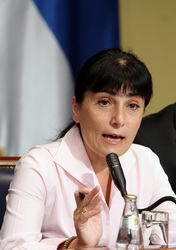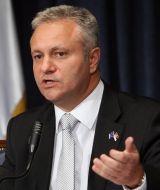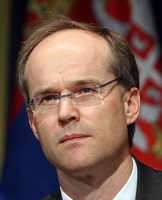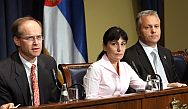Q:
A:
Government reaches agreement with IMF
Belgrade,
1 September 2009
Serbian Minister of Finance Diana Dragutinovic today stated that the government has managed to reach an agreement with the IMF concerning the state budget and fiscal policy for 2009, adding that further negotiations concerning the 2010 budget will be continued in late October.
At a press conference, held at the government building, Dragutinovic stressed that according to the second revision of the latest stand-by arrangement with the IMF there will be neither reductions in pensions and salaries nor tax increases.
There are no open issues left regarding the 2009 budget, she said.
The Minister noted that the IMF agreed to allow Serbia to run a 4.5% budget deficit, i.e. RSD 132.5 billion at state level, including local self-governments and Vojvodina.
The two sides will soon discuss the 2010 budget, she said, adding that the budget deficit for 2010 is expected to be between 3.5% and 4% of GDP.
It was also agreed that the pension, education and health systems and state administration must be reformed as soon as possible.
Dragutinovic explained that the government has already prepared savings measures which will reduce expenditures by between RSD 20 billion to RSD 25 billion per annum.
There are no open issues left regarding the 2009 budget, she said.
The Minister noted that the IMF agreed to allow Serbia to run a 4.5% budget deficit, i.e. RSD 132.5 billion at state level, including local self-governments and Vojvodina.
The two sides will soon discuss the 2010 budget, she said, adding that the budget deficit for 2010 is expected to be between 3.5% and 4% of GDP.
It was also agreed that the pension, education and health systems and state administration must be reformed as soon as possible.
Dragutinovic explained that the government has already prepared savings measures which will reduce expenditures by between RSD 20 billion to RSD 25 billion per annum.
Deputy Prime Minister and Minister of Economy and Regional Development Mladjan Dinkic stated that Serbia and the IMF agreed there will be no salary or pension cuts, or tax increases, but that public administration will be reduced.
Dinkic told the conference that a more difficult, but also more useful strategy was chosen, adding that reducing the public sectors will require the consensus of the entire society.
He stressed that this must be done because Serbia has a huge bureaucracy and a number of unnecessary regulations, adding that this will not be completed within one year.
Dinkic underlined that there are encouraging signs of recovery in Serbia’s economy, noting that the fall in economic activity has been halted and the economy has already been stable for a few months.
He voiced his belief that Serbia will manage to surmount the recession by the end of this year and record an economic growth of 1.5% in 2010.
Dinkic stressed that the government is expect to adopt the laws on civil servants and the number of civil servants needed in local administrations by October.
Serbia now has $600 million at its disposal, owing to an increase in the IMF quota, he said, adding that the money will be used to cover the 2009 and 2010 budget deficit.
Minister Dinkic specified that if the Government manage to reach agreement with the IMF on the second and third revisions of the arrangement, Serbia will receive another €1.2 billion, which will be used to cover the budget deficit and increase foreign currency reserves.
Dinkic told the conference that a more difficult, but also more useful strategy was chosen, adding that reducing the public sectors will require the consensus of the entire society.
He stressed that this must be done because Serbia has a huge bureaucracy and a number of unnecessary regulations, adding that this will not be completed within one year.
Dinkic underlined that there are encouraging signs of recovery in Serbia’s economy, noting that the fall in economic activity has been halted and the economy has already been stable for a few months.
He voiced his belief that Serbia will manage to surmount the recession by the end of this year and record an economic growth of 1.5% in 2010.
Dinkic stressed that the government is expect to adopt the laws on civil servants and the number of civil servants needed in local administrations by October.
Serbia now has $600 million at its disposal, owing to an increase in the IMF quota, he said, adding that the money will be used to cover the 2009 and 2010 budget deficit.
Minister Dinkic specified that if the Government manage to reach agreement with the IMF on the second and third revisions of the arrangement, Serbia will receive another €1.2 billion, which will be used to cover the budget deficit and increase foreign currency reserves.
IMF mission chief for Serbia Albert Jaeger stated that the second revision of the stand-by arrangement will be completed by October 20, announcing that by then the government must reduce public spending and launch pension, education and health system reforms.
Jaeger reiterated that the 2009 budget deficit will stand at 4.5% of GDP.
He said that Serbia’s drop in GDP for 2009 has been readjusted from 2% to 4% until the end of the year, adding that he hopes that in 2010 the GDP growth rate will stand at 1.5%.
Jaeger said that the IMF asked the Serbian government to increase VAT in order to deal with the budget deficit but received their assurances this is not strictly necessary as the deficit could be covered by other means. Increasing VAT in Serbia would not have a good effect on demand and the overall economy, therefore the IMF did not insist on it, said Jaeger, adding that Serbia’s current account deficit has been reduced, which is a result of reducing imports compared to exports.
He said that a reduced current account deficit is good for overall economic balance but it is not good for the budget because it will lead to a permanent loss of certain sources of state revenues.
He praised Serbia’s monetary policy, particularly concerning the stable foreign currency reserves of the National Bank of Serbia and the stability of the banking sector but said that even though the inflation rate is within the limits required by the central bank it is still very high compared to other countries in the region.
Jaeger reiterated that the 2009 budget deficit will stand at 4.5% of GDP.
He said that Serbia’s drop in GDP for 2009 has been readjusted from 2% to 4% until the end of the year, adding that he hopes that in 2010 the GDP growth rate will stand at 1.5%.
Jaeger said that the IMF asked the Serbian government to increase VAT in order to deal with the budget deficit but received their assurances this is not strictly necessary as the deficit could be covered by other means. Increasing VAT in Serbia would not have a good effect on demand and the overall economy, therefore the IMF did not insist on it, said Jaeger, adding that Serbia’s current account deficit has been reduced, which is a result of reducing imports compared to exports.
He said that a reduced current account deficit is good for overall economic balance but it is not good for the budget because it will lead to a permanent loss of certain sources of state revenues.
He praised Serbia’s monetary policy, particularly concerning the stable foreign currency reserves of the National Bank of Serbia and the stability of the banking sector but said that even though the inflation rate is within the limits required by the central bank it is still very high compared to other countries in the region.














